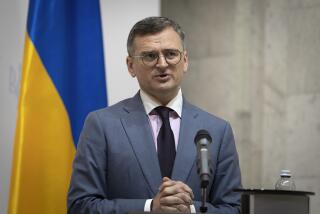Ukraine president dissolves parliament, sets Oct. 26 election
- Share via
Reporting from Kiev, Ukraine — Ukraine’s newly inaugurated president dissolved the contentious parliament Monday and set early elections for Oct. 26 in a move that will probably put further pressure on the country’s east-west divide.
President Petro Poroshenko had promised during his spring electoral campaign to resolve the standoff between parliamentary deputies of his coalition and the loyalists of former President Viktor Yanukovich, who was deposed by a pro-Western rebellion in late February.
The act of dissolving the Supreme Council was announced by Poroshenko on the presidential website late Monday and reported by the Ukrinform news agency.
Poroshenko said in a statement that the parliament was riven by conflict because many of the deputies were “direct sponsors or accomplices” of the separatists who have seized goverment and security buildings in the Russian-speaking eastern regions of Donetsk and Luhansk.
More than 2,000 people have died since April in fighting between Ukrainian troops and separatist forces, which authorities in Kiev say are armed and instigated by Russian President Vladimir Putin.
Yanukovich and his pro-Kremlin allies in the Party of Regions had kept Ukraine locked into economic integration with Russia during his turbulent years in office as support mounted in much of the central and western regions of Ukraine for a closer alliance with the European Union.
The Supreme Council has been largely dysfunctional since Yanukovich was forced to flee at the culmination of a three-month rebellion sparked by his rejection of a long-sought association deal with the 28-nation EU.
With many of the Party of Regions’ deputies absent from the legislature in the chaotic aftermath of Yanukovich’s flight to refuge in Russia, opposition politicians now aligned behind Poroshenko appointed new governors to replace Yanukovich loyalists in the eastern regions, which became gripped by armed conflict.
The embattled regions of Donetsk and Luhansk have long been integrated with Russia’s military-industrial complex and workers there feared their heavily subsidized enterprises would be shuttered if Ukraine retooled its economy to conform with the more competitive strictures of the European alliance.
Poroshenko promised during his campaign and in his inauguration speech on June 7 that his administration would work to resolve disputes between the Russian-speaking eastern regions and the rest of the country by pushing constitutional changes through the parliament to give the disparate regions more autonomy to decide trade and foreign policy.
The parliament has failed to change the election law to reflect Poroshenko’s appeal for a new slate of lawmakers to reflect the shifting political tides. It was still not clear how -- or if -- deputies would be selected from Crimea, which Russia invaded and annexed this year.
Prime Minister Arseny Yatsenyuk, who attempted to resign after the post-Yanukovich governing coalition fell apart last month, will remain head of government until the Oct. 26 election produces a new legislature, the presidential statement said.
Although Donetsk and Luhansk were dominated by Yanukovich loyalists, the former president’s authority elsewhere in the country has waned since the 2010 election that brought him to power.
Poroshenko, who staged a stunning victory on May 25 when he won 55% of the presidential vote in a field of 21 candidates, will be in the Belarussian capital of Minsk on Tuesday for a summit of the Kremlin-directed Eurasian Customs Union, which includes Russia, Belarus and Kazakhstan in an economic alliance rivaling the EU.
Poroshenko signed an association agreement with the EU days after taking office, and the Minsk meeting is ostensibly to explore possible economic collaboration between Kiev and the other former Soviet republics.
The announcement of early parliamentary elections might also have been made on the eve of the Minsk summit to fend off pressure from the Kremlin to negotiate an end to the conflict in eastern Ukraine rather than seek military victory over the separatists.
Ukrainian forces have closed in on the pro-Russia gunmen in recent weeks, posing the prospect of a rout that would reinforce the Russian media’s message that the new leadership in Kiev is hostile toward Ukraine’s Russian minority.
About 17% of Ukraine’s 46 million population was ethnic Russian, and about 24% Russian-speaking, before the Kremlin’s annexation of Crimea and the separatists’ seizure of territory in the eastern industrial basin known as Donbass.
Special correspondent Butenko reported from Kiev and Times staff writer Williams from Los Angeles.
Follow @cjwilliamslat for the latest international news 24/7.
More to Read
Sign up for Essential California
The most important California stories and recommendations in your inbox every morning.
You may occasionally receive promotional content from the Los Angeles Times.














